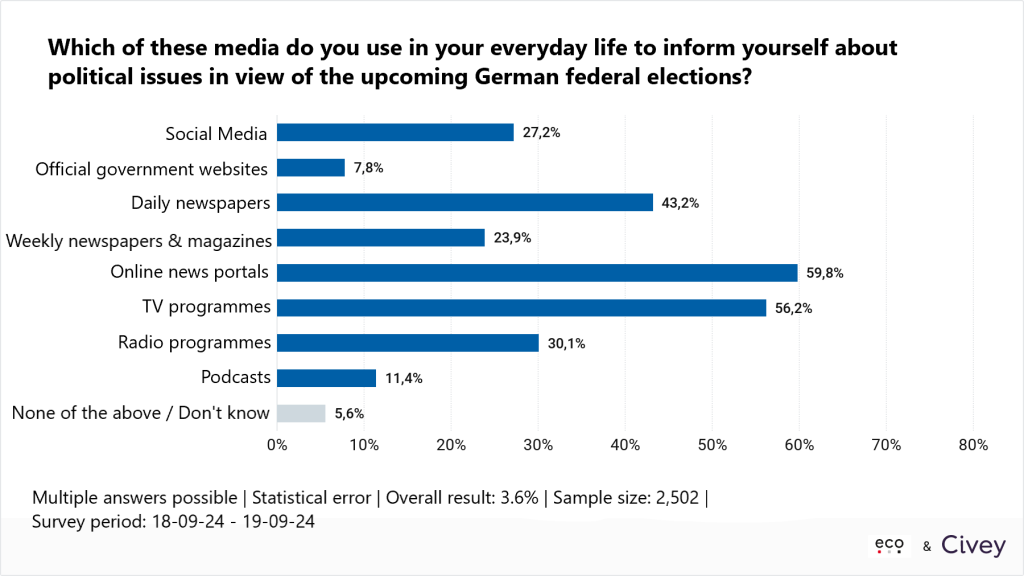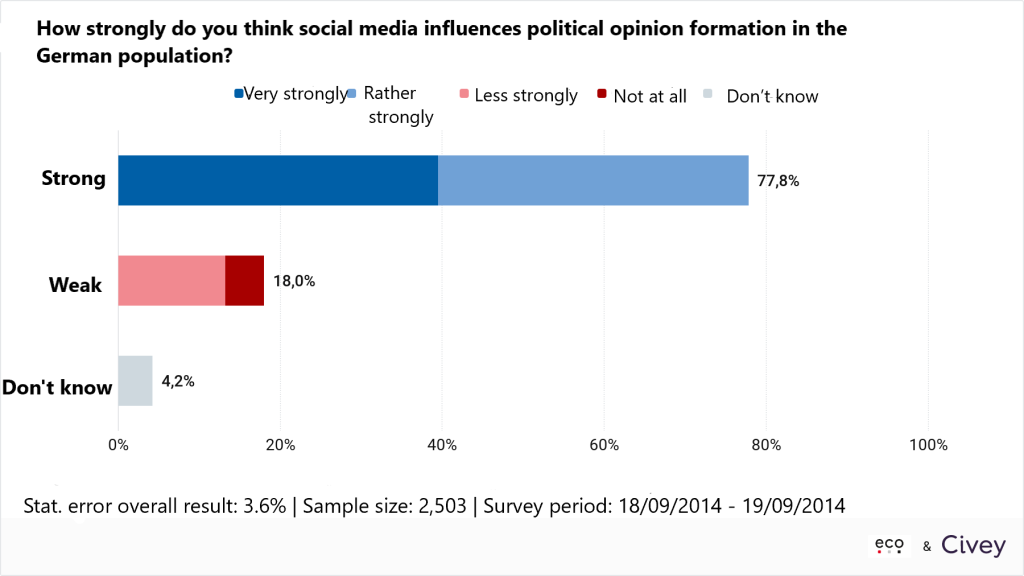- About two-thirds of German voters inform themselves about political topics online. (59.8%)
- While older voters primarily obtain their information from TV and daily newspapers, younger voters increasingly turn to social media.
- Almost 80 per cent (77.8%) of respondents attribute significant influence on political opinion formation.
The year 2024 is considered a “super election year”. In addition to the European elections in June, the world’s largest election was held in India, and the U.S. presidential elections will take place in November.
Yesterday, the two vice presidential candidates, Tim Waltz from the Democrats and J.D. Vance from the Republicans, faced off in a TV debate. Intense discussions about the results took place online during and after the debate, and traditional media also presented their analyses via social media platforms, expanding their reach.
What influence do various media information channels have on political opinion formation? eco – Association of the Internet Industry investigated this in a recent survey conducted one year before the German federal elections.
Germans are increasingly informing themselves about political topics on the Internet
The population-representative survey, conducted by the market and opinion research institute Civey* shows that online news portals (59.8 per cent), TV programmes (56.2 per cent), and daily newspapers (43.2 per cent) are particularly popular among German voters for informing themselves about political topics in the run-up to the German federal election in September 2025.
While almost a third of respondents (30.9 per cent) get their information from radio broadcasts, 27.2 per cent of participants turn to social media. Comparatively, official government websites are less frequently used as sources of information (7.8 per cent).
In the course of this year’s European elections, eco conducted a similar survey to examine which digital offerings voters in Germany use to learn about the programmes of candidates and parties. It became clear here as well: the Internet plays a decisive role in political opinion formation.
“Election decisions are increasingly being made based on information from the Internet. This has the advantage that, in addition to simply gathering information, there are also numerous opportunities to get in touch with the parties and candidates,” says eco Managing Director Alexander Rabe. Overall, the process of gathering information is becoming more dynamic as a result. Political content is being conveyed through a wide range of formats – from articles and infographics to reels – making complex issues easier to understand.
Media literacy as a prerequisite for accessing reliable information
At the same time, the wide range of news available requires Internet users to critically question the facts and opinions presented more than ever before. In an era when misinformation can be spread uncontrollably and with manipulative intent via social media, media literacy is becoming a prerequisite for accessing reliable information. According to Rabe, the foundation for this must be laid at school: “Media education is becoming increasingly important for us as a society. Especially when reaching for a smartphone, tablet or laptop becomes the default for research, children and adolescents must already be able to recognise credible sources and verify factual claims.”
The survey results show that voters aged 18 to 49 are the ones who mainly turn to social media for political information. Meanwhile, citizens aged 65 and older predominantly use TV programmes and daily newspapers for this purpose. Nevertheless, the influence of social media platforms on political opinion formation is considered significant by respondents of all age groups (77.8 per cent).
“The diversity of media is essential to ensure reliable information for voters of all ages. German citizens must be able to find reliable and diverse information on both television and the Internet. To achieve this, it is important that parties are also present across all media. Democracy thrives on discourse – and this must not be lost,” concludes Rabe.


*On behalf of eco, the market and opinion research institute Civey surveyed around 2,502 adult German citizens between 18 and 19 September 2024. The results are representative. The statistical error of the overall results is 3.6 per cent.



